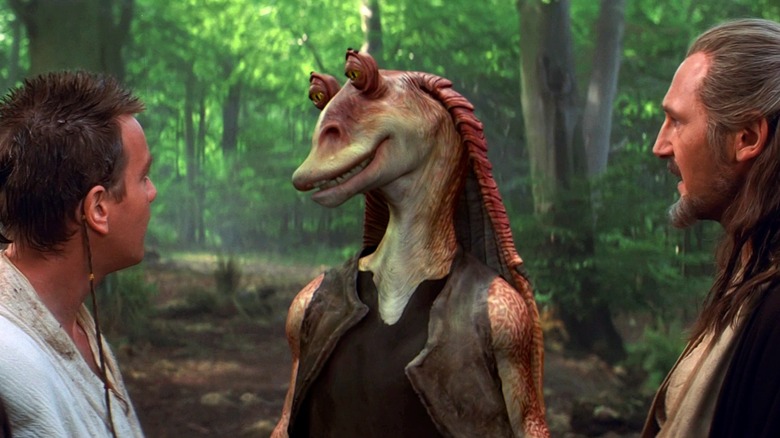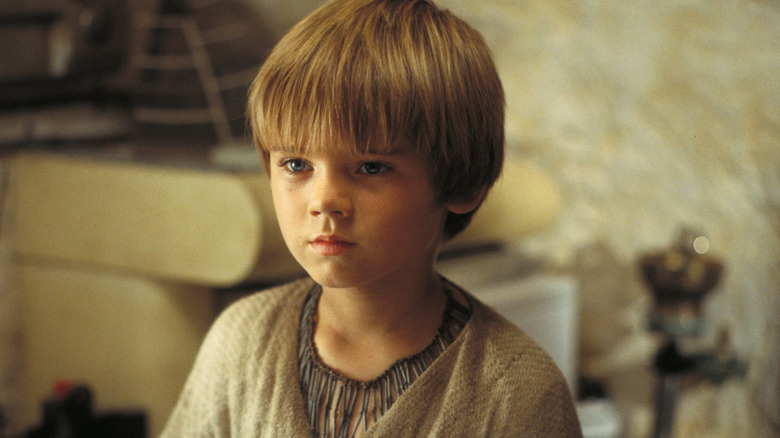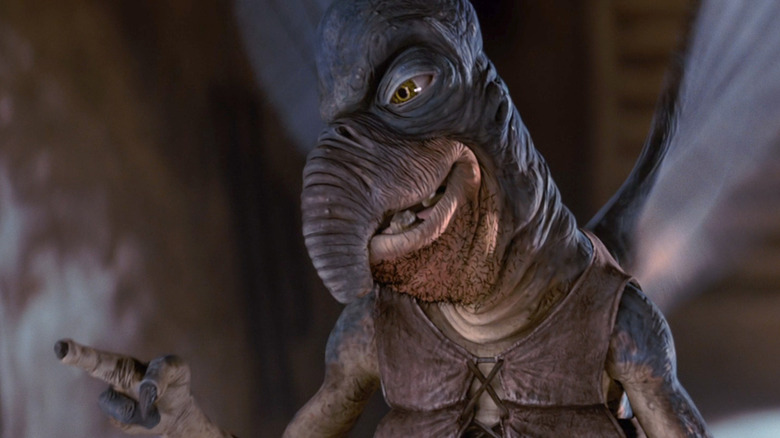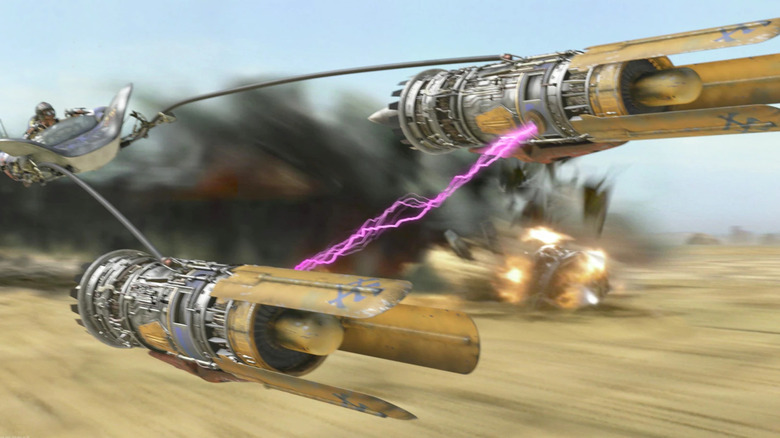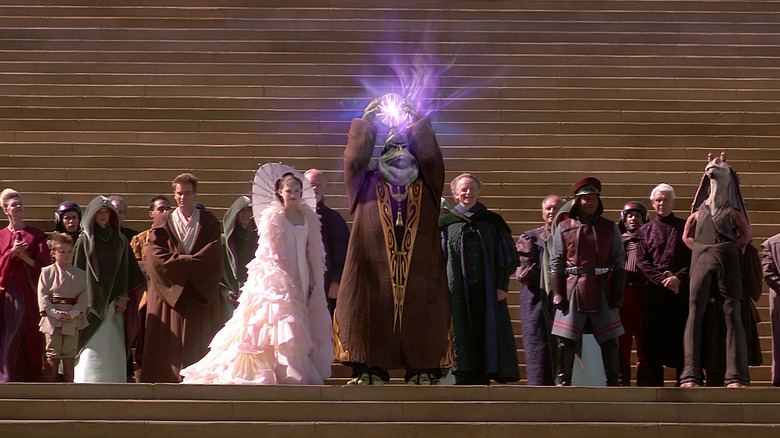Was George Lucas Enabled By Yes Men On The Star Wars Prequels? Not Exactly
One of the biggest complaints that critics of the "Star Wars" prequels have is the idea that George Lucas was simply enabled by so-called "Yes Men." As they would tell it, George Lucas was so powerful and infallible that no one around him thought they could tell him "no" for anything. More than that, these yes men would just do whatever Lucas asked without thought to whether or not it was a good idea. For a long time, it seemed like this was the established wisdom; forget the fact that many people actually love the prequels as they are and aren't concerned about what did or didn't happen behind the scenes during their development.
Was this really an issue? Did it even happen? Well, we here at /Film have taken it upon ourselves to get to the bottom of this pervasive attitude.
Yes men?
I had the opportunity to talk to producer Rick McCallum for Star Wars Insider magazine and one of the questions I asked that didn't make it into the final print issue was about this very idea, especially since he was there at Lucasfilm for decades, working on everything from "The Young Indiana Jones Chronicles" to the "Star Wars" Special Editions, the prequels, and even the un-produced live-action television show "Star Wars: Underworld." I addressed the matter point-blank, asking him, "Critics have pointed to people like you or others around George Lucas and say, 'The problem is that he had a bunch of 'yes men'. No one ever told him no.' And I'm wondering if you could dispel some of that."
To which he replied:
It's not something I would dispel categorically because on one level they're right, but to take it down to the level that we're all "yes men" is just ludicrous. Obviously, there were countless arguments and fights and discussions. Discussions, I would say, more than fights, but heated discussions about what the issue is. I'm not trying to protect myself about it, people can think whatever they want to, but George has an idea of what the film is to him. He told us — all of us, in fact — in that meeting when we were going through the visual effects, "Look, a lot of you are gonna hate this. I'm making this for my kids, and you're not gonna like Jar Jar Binks. But this is what I wanna do."
I think for all of us, we believed he earned the right to feel that way. So you buy into that and still say, "Okay, I don't agree with this?" or "God, does it have to be like this?"
But I don't think you can reduce it down to the fact that all of us were "yes people" because that just is not the truth.
That was not necessarily the answer I was expecting, but it makes a lot of sense. Watching "The Beginning," the documentary that covers the making of "The Phantom Menace" shows exactly that in a number of scenes featuring McCallum. He fought when he needed to, but ultimately his job was to produce George Lucas's vision, right or wrong.
Can we do it?
That meeting with George Lucas and the VFX team is on film in that documentary, and it's obvious the crew was nervous less about the content and more about how they were going to pull off the technology in the first place.
McCallum told me that the technology was the most harrowing part of the production and that the sandstorm in Tunisia that destroyed their sets for "The Phantom Menace" was easier to handle than the VFX challenges of making Lucas's dreams become a reality:
I was the very first paid person to say, "F–k me, how are we gonna do this?" I put on a brave face. But I knew what we could do practically. And the rest was, "How do we do it?"
Once you agree to start making a film, the studio locks in the date it's going to be distributed. And those days there was no way you could change that, so we had a date for the release. We just had to move forward, and I don't think any of us had any idea of how we were going to achieve 60-70% of the visual effects. For Watto, it took months just to get those wings to fly.
We'd be at ILM three times a week and the dailies would come in and you just said, "Oh my god, this is never gonna work."
The thing that always saved me and always made me feel confident was that we had guys like Rob Coleman and John Knoll, they were so brilliant and so eager and terrified at the same time. But we knew we had to do it. Everybody just jumped on board, and John was a major figurehead of that. He kept people's spirits up at ILM. He's a very special, unique person. And so did Rob in terms of the character animation, and once we got Watto's wings, we knew we could probably do anything.
But I'll tell you it was a pain. The clock was ticking. We were running out of time, but you have to have faith. Because there is no way to go back and say, "We can't do it."
Worship, love, respect, and care
McCallum explained that film is really a director's medium and the job of producing is to "worship, love, respect, [and] care about your director, [because] you want him to have the tools he needs to be able to express himself. You want to be able to find a way to make the impossible work for the money that you have."
But he also said that mutual respect included the need to be able to have transparent "frank and angry" conversations in order to work together with the director and figure out solutions that will work better for the available money. "It's a dependent relationship," he explained. "Directors who've had and enjoyed working with the same producers over a long period of time trust their producers to do the best and everything for them. And at the same time, in [post-production] and everything else, give them their honest opinions about what works or doesn't work or what they think doesn't work."
And I think we can finally put to bed the idea that George Lucas was simply surrounded by "yes men." He was surrounded by people who were experts in their craft and at the top of their game — and when it came down to it, they had no problem having those "frank and angry" conversations with the director, inside the context of helping Lucas to fulfill his vision.
Vindication
I also asked McCallum about the reevaluation that's happened around the "Star Wars" prequel trilogy (i.e. that when understanding Lucas's directorial intent of the stories, they've blossomed for audiences, especially as the older fan base has aged out and the political allegory has become more frighteningly realistic).
Specifically, I asked him whether or not it felt gratifying that Lucas seemed to be right in his goals and assessment. McCallum replied:
If you take a look at some of the data that Fox had done, the gist of it was if you're between six years old and 10 years old, Jar Jar was one of your favorite characters. And that's how old his kids were at the time, they were 6, 8, and 10 years old, and that's who we made it for. At the end of the day, yes he had a franchise. Yes, of course he was financing it himself. And yes, he wanted it to be successful. But if it had not been successful, if it had been a total turkey, he would have been fine with it.
That's the thing that most people don't understand about George is that he weighs it all up. He's a good economist. He knows what he can lose and what he can win on. And at the same time, you know, if nobody had seen it he would have said, "Okay, fine."
"Know your audience" has always been sage advice for writers, filmmakers, and creatives of all types. It's apparent that George Lucas knew his and surrounded himself with people who would challenge him but also pull together to make it happen.
